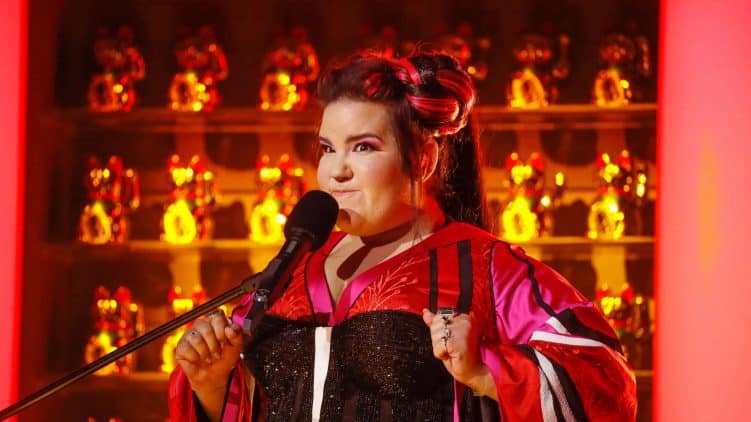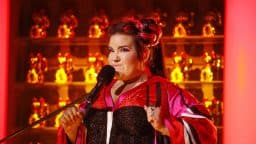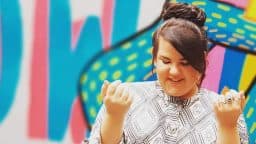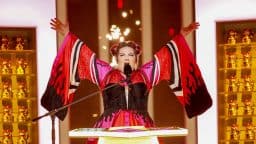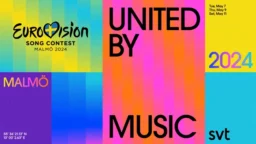She is without doubt the most colourful winner Eurovision ever saw: Netta Barzilai (1993) from Israel. With her song Toy she has managed to make many, many viewers dance. So we’ve created a concise encyclopaedia. Choose the headwords you find interesting, and take a step inside Nettaland.
A-ba-ni-bi
Netta’s favourite Israeli song contest song is the 1978 winner, sung by Izhar Cohen & The Alphabeta. Proof of her enthusiasm is this lovely acoustic rendition of what is usually a very exuberant song. This also proves how capable she is of singing far more subtly.
Ani lo buba
Is the only line in Hebrew in her song, Toy. It is, however, a very important line! It means: ‘I am not a doll.’ Not only is this one of many references to toys (see below), but it also refers to two previous Eurovision winners from the 1960s: Poupée de cire by France Gall (1965) and Puppet on a string (1967, see right) by Sandie Shaw.
A-pop (K-pop/J-pop)
Signifies Asian pop, also known as K-pop (Korean pop) or J-pop (Japanese pop). A musical genre that is expressly weird and upbeat. The widest known example is the worldwide hit Gangnam Style by PSY. Toy is reminiscent of similar Asian pop songs, partly because Netta is a great fan of the genre.
Bullying
Netta told us: ‘The fact that I was bullied is something that I’ll always carry with me, and it’s quite a heavy load. But it has formed me. It has shaped my self-confidence. Nowadays, children come up to me because they like my song so much. But when I was young, there were always kids that hated me. The fact that these pretty little girls now come up to me for a hug is my biggest triumph. It’s all I need.’
Chicken
In the song one hears a lot of cackling. Why is that? Netta: ‘This is a song about girl power, and empowerment for everyone, really. The chicken sounds have a double meaning. In my experience, bullying is the result of fear. Fear that someone steals your spot. Fear that someone will step on your toes. And so I tried to come up with a funky sound that also has a frightening ring to it. Hence the cackling.’ The chicken cackling was something that Netta herself added to the song. Afterwards she learnt that the word ‘baka’ (a vocalization of the cackling) means ‘stupid’ in Japanese, which perfectly matches the ‘stupid boy’ from the song.
Different
Rising Star was the title of the long-running Israeli preliminary contest, which doubled as some kind of reality show. Netta participated, she admits, because she ‘was out of money to pay my rent.’ Her comment on the fact that she was selected: ‘This is bigger than me. They didn’t choose Netta, they opted for something that is different. I’m happy to be able to give them something new, and perhaps Eurovision is the best place for someone who has never really fit into any of the existing categories.’
Doron Medalie
The brains behind Toy. He wrote the song, together with Stav Beger, and has previously been responsible for two other Israeli Eurovision songs: in 2015 (Golden boy, by Nadav Gudelj, at the right) and 2016 (Made of stars, by Hovi Star). Speaking to The Times of Israël, he says about Eurovision: ‘I’m forty and my work is my hobby. My first childhood memory is that of singer Ofra Haza singing Hi at the 1983 festival in Germany. Many people are ashamed about the things they liked as a child, but I’m not. Even then, I thought it was fascinating to learn about all those countries, all those cultures. Google had yet to be invented, there was no Internet. I’d only ever heard about Iceland because of the Song Contest. This contest has changed my life. Seriously. And not just because of the music.’
Encouragement
Netta: ‘My song is an encouragement for everyone who was told that they weren’t good enough, not smart enough, not pretty enough. And I believe that we can encourage others even better by turning it into a party.’
Endurance
These are hectic times for Netta. ‘Oof!’ she said during one of this week’s press conferences. ‘All of this, Eurovision… Everything happened so fast. I used to perform in front of 20 people, and now it’s an audience of 200 million. In six months’ time. Okay, it’s a process, there was a little time in between.’ Then the presenter asked: ‘And what comes after the 200 million?’ Netta’s reply: ‘Ehm… back to 20?’
Fashion
Fashion is one of Netta’s greatest hobbies. ‘My style of clothing is like Israel: a mix of various cultures.’ Together with her team she considers each new ‘look’, which includes clothing, but also make-up and hair. Every look needs to be another statement. Famous artists such as Nicky Minaj and Lady Gaga are an inspiration to her: ‘I see it as an important way of expressing myself. And besides, it’s not that there isn’t any fashion for plus-size women, just that it’s very depressing. There are flowers and such everywhere. They seem to suggest that plus-size women only have one way of showing themselves, which is the equivalent of: there really is no way of showing yourself. But we all only live once and I’m convinced that I’m beautiful, and sexy, and special. We all are! Which is, of course, the result of a process I’ve gone through, and that’s being reinforced once more this year. The exposure, this huge audience, gives me the chance to perhaps make a small change in this world.’
Favourite
Netta is one of the favourites for winning this year’s Contest. How does that feel? Netta: ‘I’m honoured. That someone like me, looking anything but standard, making music that is anything but standard, whose flag has the word ‘originality’ written all over it, is a favourite. That makes me proud. I knew we were doing something special, but I hadn’t been expecting this explosion and all this love. The hugs I get from people in Israel… It’s all so huge. That something so very different can be embraced so lovingly, it’s almost unbelievable.’
Israel
Israel has won the Eurovision Song Contest on three occasions: first in 1978, with A-ba-ni-bi by Izhar Cohen & The Alphabeta, Netta’s favourite contest entry (see above). The second was in 1979 (with Milk & Honey with Hallelujah) and then in 1998, with the very well-known Dana International and her song Diva. Netta would love to be winner number four, but apart from that she is very aware of her nationality: ‘Israel as a country brings this world creativity and innovation, for instance with artists such as Balkan Beat Box and Asaf Avidan. That is what I want to offer as well: something with an Israeli feel.’ During the commemoration of Israel’s seventy-year-anniversary Netta sang for a vast crowd a new version of Hora heachzut, a well-known Hebrew song from the sixties. She created a rave version.
Maneki Neko
During her performance at Eurovision, we see two cases of golden kittens behind Netta. These are maneki neko kittens: Japanese/Chinese lucky kittens, who wave good luck to their owners. There are several legends in existence that explain the use of a lucky cat, but the most special version is this one: Once upon a time, there was a geisha. She loved her cat, but one day her pimp caught her cat chewing on a bit of her kimono. The pimp thought that the cat was bewitched, and decapitated the animal in one swoop. Its head was sent through the air and landed with its fangs on a snake, that had meant to attack the geisha at that specific moment. The geisha was so saddened by the death of her pet, that she had it turned into a statuette. Note: when the maneki neko waves with its right paw, it means good luck. When it waves with its left paw, it means: I wish you many customers. Which could come down to the same thing. Either way: Netta’s kittens are using their left paw.
#Metoo
It has been said that this song found its inspiration in the #metoo-movement. But is that true? Netta says: ‘The song is about women who are given a voice. Although I do not believe that it’s specifically for women. It’s for everyone who has experienced opposition. By something or someone.’
Nigeria
In her youth, Netta lived in Nigeria for a while. At one of this week’s press conferences she said: ‘My father was offered a job there. In addition to my own mother, I was raised by two African women. They sang me bedtime songs whenever my mother had to work late. And the rhythm, the Afro-beat, is something that I will never forget, something I will always carry with me. You can hear it when I scat.’ (See also ‘scat’, below.)
Pikachu
‘I’m taking my Pikachu home’ is one of the lines from Netta’s song. Even though she hasn’t written the lyrics to Toy herself, this is one of her personal additions. Pikachu is a Pokémon figure, and ‘everybody’s favourite’, says Netta.
Plus size
With her appearance, Netta also intends to prove that a more buxom woman can still be a star. In her own words: ‘I think that plus-size men and women don’t celebrate themselves often enough. Because they think they’re not worth it. But who, pray tell, can decide for me that I can’t be a pop star? That I can only sing songs by Aretha Franklin or Adele? Does everything that I want to sing need to be in ‘Big mama’-style? People should do what their heart tells them to do, not what society comes up with on their behalf. But I don’t need to put those messages into words, I can just get on stage and sing and dance my heart out.’
Potatoes
Netta studied jazz music, but didn’t always want to listen to what her teachers had to say. She didn’t, for instance, like scatting the way it was intended, ‘I was always just cacklin, ha ha. I loved the improvisational freedom. I love creating songs live, on stage.’ An example of a new song that came to be in exactly this way is Potatoes, in which you can see her with her band. A sampler of the many things Netta Barzilai is capable of, in addition to Toy.
Ring
Netta wears a small ring that once belonged to her grandmother, who died when Netta was twelve. That grandmother was a strong, independent woman. Netta was supposed to receive the ring at the time of her marriage, but her grandfather has decided to give it to her now, on the occasion of the Eurovision Song Contest. ‘Now I can feel her with me, I can feel her strength.’
Scat
Singing words without meaning, a style often used in improvised jazz. Netta does this after one and a half minute in Toy, right after the phrase ‘ani lo buba’ (see above). She has said that the influence of her time spent in Nigeria can be heard in the timing of her scat (see ‘Nigeria’).
Stefa
The lyrics mention a certain ‘stefa’ (‘I don’t care about your stefa, baby’). The word ‘stefa’ is slang for a stack of bank notes that big spenders carry around visibly in their breast pocket. And with which these braggarts actually want to say: ‘I can buy you. I can do whatever I want.’ Netta’s line, therefore, means: I couldn’t care less about your money and your power.
Toys
The ‘toy motif’ had never before been used for a Eurovision song, the writers of the song decided. And with Netta in mind as the singer, this soon turned into: ‘I’m not your toy, you stupid boy.’ The song references teddy bears, Barbie and the song ‘Simon says’ (in which ‘a commander’ tells the other players what to do, but only when his command starts with the words ‘Simon says’) and Pikachu. (See above.)
Voice looper
Netta a voice looping-artist, meaning: in her songs, she often uses a device that records her voice and plays it back instantly, giving her the ability to sing several things at once. She operates it live. It’s her trademark. But… she does not use it during Eurovision. The voice looper would be a way of using a live instrument on stage, which is against the contest’s regulations. She is now using backing vocalists who reproduce the voice looper-effect a capella. Still, Netta does use a different type of looper. A super looper, that doesn’t use sound, but light. And so, when she mentions Pikachu, you get to see Pikachu.
Waffles
Netta tells us about her visit to the Netherlands: ‘When we were in Amsterdam (for Eurovision in Concert) we went to a little waffle restaurant. A girl entered the restaurant and started screaming. She ran back outside to her friends, and we didn’t know what was going on. She reappeared, almost in tears and said: “You’re going to win the Song Contest!” And then she started singing my song. This helped me realize that people know me, not only in Israel, but even much further away. It’s unbelievable. It’s insane, I don’t even know what to make of that.’
Winning
And what if Israel wins? Netta prefers not to think about that. ‘I don’t want to jinx anything. I just want to work hard. Israel celebrates its seventieth anniversary this year, so yeah, if it happens, the people will be very happy. And people in Israel need reasons to be happy.’
Wonder Woman
A superhero, originally from the DC Comics comic book universe, but even better known from television series (in which she is portrayed by Lynda Carter) and the 2017 movie of the same title, in which Wonder Woman is portrayed by Gal Gadot, an actress from… Israel.
Sources: Eurovision.tv, press conferences song contest, Wiwbloggs, the Times of Israel
